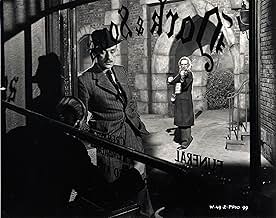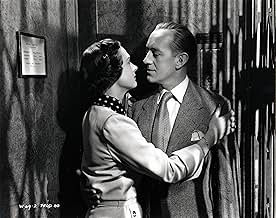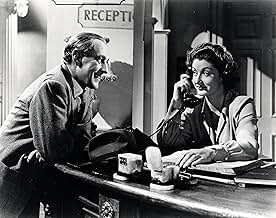CALIFICACIÓN DE IMDb
7.3/10
2.3 k
TU CALIFICACIÓN
Agrega una trama en tu idiomaWhen a lonely, unappreciated farm-equipment salesman discovers he has only a few weeks to live, he withdraws his savings for a final holiday at a "posh" resort.When a lonely, unappreciated farm-equipment salesman discovers he has only a few weeks to live, he withdraws his savings for a final holiday at a "posh" resort.When a lonely, unappreciated farm-equipment salesman discovers he has only a few weeks to live, he withdraws his savings for a final holiday at a "posh" resort.
- Dirección
- Guionistas
- Elenco
Grégoire Aslan
- Gambini
- (as Coco Aslan)
Eveline Kirkwood-Hackett
- Miss Hatfield
- (as Mme. Kirkwood-Hackett)
- Dirección
- Guionistas
- Todo el elenco y el equipo
- Producción, taquilla y más en IMDbPro
Opiniones destacadas
A small-town salesman, George Bird, learns that he is suffering from an incurable condition, leaving him only weeks to live. With no family or friends to care for, he decides to spend his modest savings on his first and last stay in a grand hotel.
The other guests soon notice that he is new to hotel life, and react to him in different ways - some disdainful, some intrigued and friendly. These guests reflect the old English class-system, with its myriad of sub-classes, starting to die out by 1950, largely because of the left-wing postwar government that had been so championed by J.B. Priestley, author of this screenplay.
Before long, Bird's life seems to be opening out, with job-offers, investment opportunities, even a chance of love. A bitter irony of course, as these opportunities will never be enjoyed (or so we are to assume).
The comfortable hotel life gets a jolt when the staff are suddenly called-out on strike, instantly shaking-up the class-system, as all the guests have now got to try to pitch-in and help, as best they can. This provides for a number of accidental meetings that move the plot forward dramatically. And the effect on Bird's humdrum life, suddenly turned roller-coaster, is dramatic indeed.
Interesting to see the yet-undiscovered Sid James as a dodgy gambler, and David McCallum's father (also David) on the violin, beginning and ending the story with a simple but curiously haunting theme.
For a film that has given so much pleasure - check the other IMDb reviews - it may seem spoilsport to suggest that Alec Guinness does not quite carry conviction as such a small and narrow character as Bird. This is someone who just earns his daily pittance and then goes home to read the paper and smoke his pipe. For this role, Guinness simply looks and sounds too cultivated, too sociable, altogether too biddable. (Ironically there was a character actor called Norman Bird, who would have been perfect!)
The other guests soon notice that he is new to hotel life, and react to him in different ways - some disdainful, some intrigued and friendly. These guests reflect the old English class-system, with its myriad of sub-classes, starting to die out by 1950, largely because of the left-wing postwar government that had been so championed by J.B. Priestley, author of this screenplay.
Before long, Bird's life seems to be opening out, with job-offers, investment opportunities, even a chance of love. A bitter irony of course, as these opportunities will never be enjoyed (or so we are to assume).
The comfortable hotel life gets a jolt when the staff are suddenly called-out on strike, instantly shaking-up the class-system, as all the guests have now got to try to pitch-in and help, as best they can. This provides for a number of accidental meetings that move the plot forward dramatically. And the effect on Bird's humdrum life, suddenly turned roller-coaster, is dramatic indeed.
Interesting to see the yet-undiscovered Sid James as a dodgy gambler, and David McCallum's father (also David) on the violin, beginning and ending the story with a simple but curiously haunting theme.
For a film that has given so much pleasure - check the other IMDb reviews - it may seem spoilsport to suggest that Alec Guinness does not quite carry conviction as such a small and narrow character as Bird. This is someone who just earns his daily pittance and then goes home to read the paper and smoke his pipe. For this role, Guinness simply looks and sounds too cultivated, too sociable, altogether too biddable. (Ironically there was a character actor called Norman Bird, who would have been perfect!)
The central character (Guiness) is "a modest unassuming salesman of agricultural implements" (Wikipedia). A respectable almost classless person whose unassuming manner, unglamorous job and modest salary have limited his social circle. For the first (and last) time circumstances allow him to spend freely and, for want of any other idea, stay a few weeks at a very upmarket seaside hotel. Its clientele have only one thing in common: either possessing wealth or using the opportunity to accumulate it. Some are rich and lack class, others have power and status as well as wealth. The Guinness character for the first time has an opportunity to network with important people.
Guinness in a way reprises his role in The Man in the White Suit - a thoroughly honest man innocent in the ways of the world whose modest manner and appearance belies his inventive genius. Yet is remarkably unchanged by success and continues to treat both high and low equally - and cause a surprising degree of unintended upset.
A good story with excellent cast, it is a less demanding part for the chameleon genius of Guinness. As usual with Priestley very well crafted story-telling. However the film dates from 1950 - 5 years after WW2 when people were looking to a better future and trying to put grief behind them. During WW2, Priestley had been the nation's uncle, providing not false comfort but a steadying presence putting the worlds events into a assimilable form for the average person. With the end of the war, the public's need for Priestley (much as their need for Churchill) ended. The film's sour end seems to have no point other than to say just when things are looking up and people at their most cheerful and optimistic, everything can be be dashed to the ground in an instant.
Guinness in a way reprises his role in The Man in the White Suit - a thoroughly honest man innocent in the ways of the world whose modest manner and appearance belies his inventive genius. Yet is remarkably unchanged by success and continues to treat both high and low equally - and cause a surprising degree of unintended upset.
A good story with excellent cast, it is a less demanding part for the chameleon genius of Guinness. As usual with Priestley very well crafted story-telling. However the film dates from 1950 - 5 years after WW2 when people were looking to a better future and trying to put grief behind them. During WW2, Priestley had been the nation's uncle, providing not false comfort but a steadying presence putting the worlds events into a assimilable form for the average person. With the end of the war, the public's need for Priestley (much as their need for Churchill) ended. The film's sour end seems to have no point other than to say just when things are looking up and people at their most cheerful and optimistic, everything can be be dashed to the ground in an instant.
I love this film and it's one of the few I've watched time and time again. It's a forgotten jewel and is infrequently mentioned. For me it has everything that was important of it's era. The social comment is mingled into an entertaining story. How the Health Service is expanding but people go hungry. An over worked Doctor making mistakes. George Bird being projected into a world that is not his own. The irony of riches coming his way when he thinks he has little time left. The Union's getting their grip on the country with strike action. How the upper classes view the lower and vice versa. How George Bird is now viewed as upper class because of his new setting. Post war money laundering. How war heroes can't find work. Love and jealousy. And the ironies - how he buys a dead man's clothes. How he swerves a car to avoid a dog that is due to be destroyed and turns into a road called 'Fallow End.' Then there is the acting. Sid James gives one of his great performance. His 1940's and 1950's work was superb. Sadly remembered for his Carry On performances more than the superb actor that he was. He just holds the scenes and in some cases is competing well with Guinness. For Guinness this is an early film. Ernest Thiesiger makes a great appearance along with many others including the delightful Kay Walsh. Esma Cannon's acting is well done - better than her later performances where 'silly' scripts let her down.
Please do see it if you can. It's a little gem.
Please do see it if you can. It's a little gem.
Last Holiday contains the first really dramatic performance by Alec Guinness. It's also the first time he's carrying a film as per the billing on the strength of his abilities. It's one beautiful performance in a picture with a universal message.
Alec Guinness plays your British every man who having no wife, no family, and no close relatives is likely to be remembered by very few when he passes on and then for a short time. He's given the news that the grim reaper is close, it might be a matter of a few weeks or a few months. What to do but go out and just enjoy things while you can.
So he packs off and stays at the small but posh Regal Hotel, a seaside resort much prized by the British vacationers. And he has some phenomenal luck there, winning huge poker pots, longshot horse racing bets coming in. He even finds some love with hotel housekeeping manager Kay Walsh. But how to tell the new friends he's made what is in store for him?
J.B. Priestley wrote the original script and in my opinion should have been a candidate for all kinds of awards. It is direct and simple and never maudlin. Guinness got the character down perfectly. And the ending is truly ironical.
Which must have pleased and singed director Henry Cass a bit. Back in the 30s when Guinness was starting in the profession he tried out for a stage production directed by Cass who told him in no uncertain terms he was a no talent bum. This comes from a biography of Guinness. Kind of like Phil Rizzuto who was told he'd never be a ballplayer by Casey Stengel and then having him as his manager on the Yankees after becoming an All Star.
One should watch Last Holiday together with Grand Hotel and note some of the similarities and the differences with Lionel Barrymore and Alec Guinness both portraying men under a death sentence.
I think the message is the same, you never know when you're checking out so live accordingly.
Alec Guinness plays your British every man who having no wife, no family, and no close relatives is likely to be remembered by very few when he passes on and then for a short time. He's given the news that the grim reaper is close, it might be a matter of a few weeks or a few months. What to do but go out and just enjoy things while you can.
So he packs off and stays at the small but posh Regal Hotel, a seaside resort much prized by the British vacationers. And he has some phenomenal luck there, winning huge poker pots, longshot horse racing bets coming in. He even finds some love with hotel housekeeping manager Kay Walsh. But how to tell the new friends he's made what is in store for him?
J.B. Priestley wrote the original script and in my opinion should have been a candidate for all kinds of awards. It is direct and simple and never maudlin. Guinness got the character down perfectly. And the ending is truly ironical.
Which must have pleased and singed director Henry Cass a bit. Back in the 30s when Guinness was starting in the profession he tried out for a stage production directed by Cass who told him in no uncertain terms he was a no talent bum. This comes from a biography of Guinness. Kind of like Phil Rizzuto who was told he'd never be a ballplayer by Casey Stengel and then having him as his manager on the Yankees after becoming an All Star.
One should watch Last Holiday together with Grand Hotel and note some of the similarities and the differences with Lionel Barrymore and Alec Guinness both portraying men under a death sentence.
I think the message is the same, you never know when you're checking out so live accordingly.
10albee-2
A poignant, bitter-sweet comedy that drives home its points in clever, subtle ways. Surprisingly, for a film 50 years old, the acting, direction and story line keep it fresh and timely. Alec Guiness "made his bones" in excellent early films such as this and gave us a sneak preview of the greatness that was to come.
¿Sabías que…?
- TriviaRemade in 2006 with Queen Latifah in the lead role.
- ErroresBird states that he made about 9 Pounds a week. This is about 470 Pounds per annum. When his manager is trying to get him to stay he first offers to raise his salary to 400 Pounds p.a.
- Citas
George Bird: How do you keep smiling with a stiff upper lip?
- ConexionesRemade as Las vacaciones de mi vida (2006)
Selecciones populares
Inicia sesión para calificar y agrega a la lista de videos para obtener recomendaciones personalizadas
- How long is Last Holiday?Con tecnología de Alexa
Detalles
- Tiempo de ejecución1 hora 28 minutos
- Color
- Relación de aspecto
- 1.33 : 1
Contribuir a esta página
Sugiere una edición o agrega el contenido que falta

Principales brechas de datos
By what name was Last Holiday (1950) officially released in India in English?
Responda






























